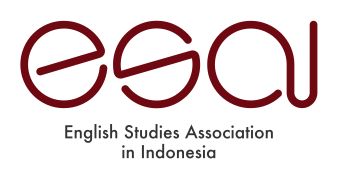Language Proficiency as A Social Capital among Indonesian Migrant Workers: from Language Acquisition to Language Maintenance
Abstract
The economic and social pressure has led many Indonesian to become migrant workers in some foreign countries for a better life. Their poor language proficiency due to their lack of preparation prior to their departure has hampered them from communicating well in the country of destination which they have lived. This paper presents the analysis of how the Indonesian migrant workers prepared their language proficiency in their country of origin,Indonesia, how they have acquired the language of the receiving country in which they have worked, and how they have maintained the acquired foreign language upon their return toIndonesiaas their social capital. This paper found out that language preparation, language acquisition and language maintenance play very important roles in the life of Indonesian migrant workers. Poorly planned language training has made the migrant workers face many problems in communication in the country of destination. This condition can be gradually solved by acquiring the language during their work in the country of destination and this language acquisition through immersion has become their social capital; however, such social capital is not well processed to empower the community in most areas of the country of origin,Indonesia. This fact is worsened by the reality that the formal government structure in the villages seems to neglect this self-empowered group of the community.
Key words: Economic and social pressure, migrant workers, proficiency, acquired, social capital
Full Text:
PDFReferences
Bordiou, P. 1986. “The Forms of Capital”. In J.G. Richardson (Ed.). Handbook and Theory for the Sociology of Education:241-258. New York: Greenwood.
Burt, R.S. 1992. Structural Holes: The Social Structure of Competition. Cambridge, M.A.: Harvard University Press.
Canale, M. and M. Swain. 1980. Theoretical Bases of Communicative Approach to Second Language Teaching and Testing. Applied Linguistics 1:1-47.
Chiswick, Bary. 1978. “The Effect of Americanization on the earning of Foreign-Born Men.” Journal of Political Economy 86, pp. 892-921.
Chomsky, N. 1965. Aspects of the Theory of Syntax. Cambridge, MA: MIT Press.
Crystal, David. 2003. English as a Global Language. Cambridge: Cambridge University Press.
D’Avein, R.A. and Kesner, I. 1993. “Top Managerial Prestige , Power, and Tender Power Response: A Study of Elite Social Networks and Target Firm Cooperating during Takeovers” : Organization Science, 4:123-151.
Davila, Arberto & Mora, Maria. 2001. “Hispanic Ethnicity, English Skill Investment and Earnings,” Industrial Relations 40 (I), pp. 83-88.
Dudley-Evans, Tony and St. John, Meggie Jo. 1998. Developments in ESP: A Multi-disciplinary approach. Cambridge: Cambridge University Press.
Ellis, Rod. 1984. Classroom Second language Development. Oxford: Pargamon.
Ellis, Rod. 1994. The Study of Second language Acquisition. Oxford: Oxford University Press.
Grandovetter, M.S. 1992. “Problems of Explanation in Economic Sociology.” In N. Nohria and R. Eccles (Eds). Networks and Organizations: Structure, Form and Action:25-56. Boston: Harvard Business School Press.
Holmes, Janet. 1994. An Introduction to Sociolinguistics. London: Longman.
Hornberger, N. 1998. “Language Policy, Language Education, Language Rights: Indigenous, immigrant, and International Perspectives.” Language in Society 27:439-458.
Huguet, Jerrol W. 2003. “Recent Trends in International Labour Migration”, Fifth Asian and Pacific Population Conference, Selected Papers, Asian Population Studies Series No. 158 (ESCAP, Bangkok).
Huguet, Jerrol W. 2010. “Linking International Migration and Development in Asia.” In Economic and Social Commission for Asia and The Pacific (Workshop on Strengthening National Capacities to Deal with International Migration). ESCAP United Nations.
Hyltenstam, K., and Stroud, C. 1996. “Language maintenance.” In H. Goble, P.H. Nelde, A. Stary, and W. Wolck Contact Linguistics: An International Handbook of Contemporary Research. Berlin: Walter dee Gruyter, pp. 567-578.
Hymes, D. 1970. ‘On Communicative Competence, In J. Gumperz and D. Hymes (Eds). Directions in Sociolinguistics. New York: Holt, Rinehart, and Winston.
Jacobs, J. 1965. The Death and Life of Great American Cities. London: Penguin Books.
Klein, W. 1986. Second Language Acquisition. Cambridge: Cambridge University Press.
Krashen, S. 1981. Second Language Acquisition and Second Language Learning. Oxford: Pargamon.
Littlewood, William. 1992. Communicative Language Teaching. Oakleigh: Cambridge University Press.
McCarthy, Michael. 1994. Vocabulary. Oxford: Oxford University Press.
McDonoughn Jo and Shaw, Christopher. 1993. Materials and Methods in ELT: A Teacher’s Guide. Oxford: Blackwell.
McManus, Walter. 1985. “Labor Market Costs of language Disparity: An Interpretation of Hispanic Earning Differences.” American Economic Review 75, pp. 818-827
McManus, Walter. 1989. “Labor Market Effects of language Enclaves: Hispanic Men in The United States of America. ?
Mesthrie, R. 1999. Language Loyalty. In B. Spolsky (ed.). Concise Encyclopedia of Educational Linguistics. Amsterdam: Elsever, pp. 42-47.
Nahapiet, Janine. A. 1988. Managing the Relationship …….
Nahapiet, Janine. and Goshal, Sumantra. 1998. “Social Capital, Intellectual Capital, and The Organizational Advantage.” In Academy of Management Review 23:242-266.
Nunan, David. 1993. Syllabus Design. Oxford: Oxford University Press.
Rea-Dickins, Pauline and Germaine, Kevin. 1993. Evaluation. Oxford: Oxford University Press.
Regional Thematic Working Group on International Migration Including Human Traficcking (RTWG). 2008. Situation Report on International Migration in East and South-East Asia (International Organization for Migration, Bangkok). In Jerrol W. Huguet. 2010. Linking International Migration and Development in Asia. In Economic and Social Commission for Asia and The Pacific (Workshop on Strengthening National Capacities to Deal with International Migration). ESCAP United Nations.
Riley, Philip. 2007. Language, Culture and Identity. London: Continuum.
Riley, Philip. 2007. Language, Culture and Identity. London: Continuum.
Sukamdi. 2008. “Indonesia”, Asian and Pacific Migration Journal, vol. 17, Nos. 3-4, pp. 325-334.
Taylor, G. 1986. ‘The Meaning and Use of the Term “competence” in Linguistics and Applied Linguistics’. Applied linguistics 9: 148-168.
Thomas, Janny.1997. Meaning in Interaction: an Introduction to Pragmatics. London: Longman.
DOI: http://dx.doi.org/10.30813/jelc.v1i2.314
Refbacks
- There are currently no refbacks.



2.jpg)



